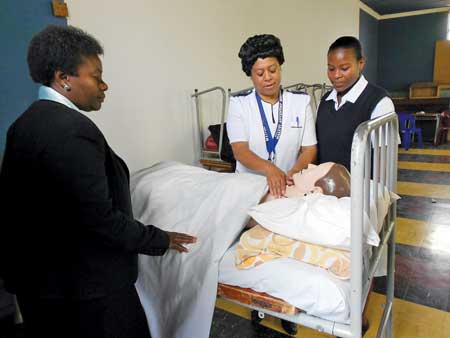by Ann LoLordo

Jhpiego, an international health non-profit and affiliate of Johns Hopkins University, has partnered with a faith-based health organization in Lesotho to strengthen nursing education and increase the numbers of these essential health workers who provide lifesaving care to women and families.
Known as the Kingdom in the Sky, the southern African country of Lesotho has the third-worst HIV prevalence rate in the world—23.6 percent. The average life expectancy is 41 for men and 39 for women. The World Health Organization estimates that this landlocked nation of 2 million people has only 43 percent of the nurses and midwives that it needs.

To address this dearth of frontline health workers, Jhpiego has launched a multipronged effort to ensure that more nurses are educated and nursing students receive a quality education and the hands-on clinical experience they need to provide competency-based care. This action plan focuses on developing the skills of preceptors, providing continuous supportive supervision to ensure the integration of skills into their teaching, upgrading skills labs and equipment, updating learning materials, and establishing a monitoring and evaluation system for nursing education. Jhpiego is working in collaboration with the Christian Health Association of Lesotho (CHAL) and its four nursing schools.
“In Lesotho, Jhpiego is committed to helping our partners strengthen nursing education and develop a growing work force of skilled nurses who will deliver care competently and humanely,’’ says Leslie Mancuso, PhD, RN, Jhpiego’s CEO and president, who began her career as a pediatric intensive care nurse. “The people of Lesotho deserve no less.”
Jhpiego staff have trained 71 preceptors thus far. Of those, eight are receiving additional training and mentoring to become “qualified trainers”—proficient providers who are able to train others in clinical skills.
Nursing instructor Isabel Nyangu, a participant in the training, says the course gave her new insights into preparing lesson plans and adapting different teaching methods to her courses. She finds the emphasis on providing feedback to students and the supportive supervision by Jhpiego staff both critically important. “Our knowledge base is going to improve and we will maintain our teaching skills up to standards,” she says.
In its efforts with CHAL to graduate competent nurses and keep them qualified, Jhpiego is helping the Lesotho Nursing Council strengthen regulatory and educational standards and improve professional development.
Jhpiego’s work in Lesotho has the support of the Ministry of Health and Social Welfare and is funded by the U.S. Agency for International Development’s global flagship Maternal and Child Health Integrated Program (MCHIP).